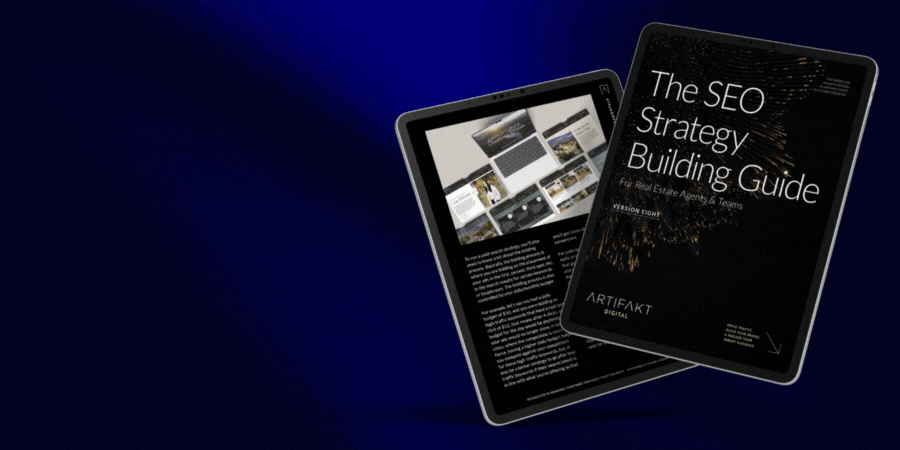As a real estate agent trying to attract new clients in a specific area, your local SEO strategy is a really important part of your overall SEO strategy. That’s because building out a solid local SEO strategy helps you promote your services to your local audience right when they’re looking for them.
Some examples of local SEO is when someone searches:
- Based on their current location: “real estate agents near me”
- Based on a neighbourhood or community: “real estate agents in Sherman Oaks”
- Based on a city: “real estate agents in Los Angeles”
As an agent, showing up in the first few results for localized search results like the ones above is probably going to bring you in a lot of new business.
And of course, because most agents want to build a strong localized SEO presence with these highly coveted search terms, it’s difficult to both get there and difficult stay there; it’ll take time for you to build out your local SEO strategy, but it’s worth it in the long run.
★ Want to learn more about building an SEO strategy? Have a look at these posts:
- Understanding SEO Titles and Meta-Descriptions on Your Real Estate Website
- Building a Well-Rounded Search Strategy Using Both Organic and Paid Sources
- Why Building Trust is a Key Part of a Successful SEO Strategy
If part of your strategic plan is to focus on building your local search presence, here are a few places you should concentrate your efforts:
1. Maintain and Optimize Your Google MyBusiness Page
Your GMB page is one of the most important aspects of your local search strategy as it can directly contribute to your page showing for those coveted local search terms as a business page or in a map result. One of the reasons is that the physical address for a GMB page is actually verified by Google, which means it’s important that when you set up your GMB page, you choose an address that you can actually verify (by receiving a physical postcard with a code on it) and that’s inline with where your audience might be searching (the address is in the area you want to show up for those local search results in).
Even Google says: To improve your business’s local ranking, use Google MyBusiness to claim and update your business information.
And you should keep it up to date with as much information as you can, including posts, hours of operation, photos, etc. Having a strong, up-to-date, and relevant GMB page will directly contribute to building a strong and relevant local SEO strategy.
You also should focus on getting as many Google reviews as you possibly can. Google reviews directly influence local search results, and as well, are part of a strong online presence strategy.
If you want to learn more about why you should have a Google MyBusiness page and how to set it up, check out this post right here.
One other thing to bring up here is your “NAP’, which stands for name, address, phone number.
Your NAP should be consistent across your local SEO strategy, and it’s relevant to all of the points below. So, whatever information you use as your NAP on your GMB page is the same information you should use everywhere else.
2. Implement a Local-Based Content Strategy
Having a blog strategy in place that has a lot of content regularly added is really important for a number of reasons, like contributing to the growth of your overall SEO strategy; but having a local-focused blog strategy is important for growing your local SEO strategy.
This means writing content that’s relevant to the area around your NAP.
For example, writing content about community events, things to do in the neighborhood, and nearby restaurants and businesses around your NAP area, and ensuring they’re linked correctly, can make a big difference in you telling search engines and users alike that you’re an expert in the area around your NAP.
★ Want to learn more about building a quality content strategy? Have a look at these posts:
- Writing Successful Real Estate Content that Converts
- Optimizing Your Content for Humans (And Not Just for Search Engines)
- How to Plan Content that Attracts and Engages
3. Make Your Address Information Obvious
It’s important to ensure that your website is completely up to date with your NAP information, and that shows it in a couple of different places:
- On your contact page: You should have a main contact page that has all of your NAP information and an embedded Google map location.
- In the footer: Your footer displays on every page of your website, so you should have your NAP information displayed there as well for both visitors and search engines.
Make sure all of your NAP information on your website is crawlable by search engines, otherwise, it won’t matter much.
You should also work towards making sure your NAP information is available on other websites. Some of the easier places to get your NAP added are on websites with a portfolio that you can manage yourself, like Facebook, Yelp, Zillow, your brokerage, etc. Some of the ones that are more difficult are the ones that you don’t manage directly, but rather, just submit your information to, like a local business directory, the BBB website, etc. However, it’s still usually pretty easy to get added to those as those directories want to have accurate information, so they’re likely to add you if you ask.
4. Build Inbound Links from Other Local Businesses
Inbound links are a key part of your overall SEO strategy, and it’s no different when it comes to your local SEO strategy, other than that you’re looking for local links.
By getting links from local businesses and websites with a NAP within your NAP can really increase your authority in that area.
And while links are always good to get, there’s something to be said for quality as well. Let’s say you and I both owned a shoe store and we both have a website. If we link to each other, that’s great. But if I got a link from Adidas, that would be much better because Adidas is more authoritative as a link source.
Basically, when it comes to you overall SEO strategy, the more quality links the better; and when it comes to local SEO strategy, the more quality local links the better.
If you’ve never tried to get inbound links before, trust me, it’s not that easy.
But getting local links can be a bit easier because you can build a relationship with them and offer them something of value. For example, just reaching out to a huge company and asking them for a link to your website isn’t going to be easy, but if you write a blog post on your website about a few local restaurants and businesses, then ask them for a link because you’ve promoted their business in a blog post, you’ll probably get one.
Have you ever sponsored or taken part in a community event? It’s a great way to show that you care about and give back to your local community, but it’s also another good place to get a link back from a website that’s within your NAP. Most community events have websites, and if they’ve been doing the event annually, then their website has probably been online a long time and has a good domain authority, so a link from them is worth pursuing.
5. Tag Your Videos
A lot of agent make videos and post them to YouTube. Whether it’s a market update or information about a listing, video is a great format to get your message out. But if you’re posting videos to YouTube, you should also consider geo-tagging.
Geo-tagging your videos allows you to indicate the location of your video is for the purposes of it showing up in search, so it’s a key part of further building your local SEO strategy.
Remember, It’ll Take Time…
Just like your overall SEO strategy will take time, optimizing and building out your local SEO strategy will take time too. When it comes to SEO, nothing can really happen overnight; but if you’re able to roll out a solid SEO strategy, that includes local SEO, over time, the results will absolutely pay off.
Want to learn more about SEO and get more traffic to your website? Our SEO Strategy Building Guide is a mix of curated content and self-guided workbook that will help provide insight on how you can build and implement a modern SEO and overall search strategy.




